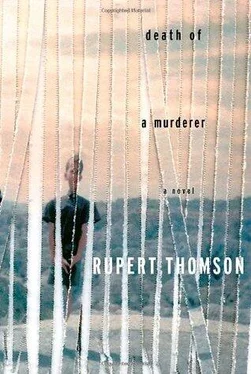He knew what she was up to. She was trying to make something that was actually a chore sound like a game — grown-ups were always doing that — but she wasn’t very good at it. There was no warmth in her voice, no sense of adventure or intrigue. He thought he’d better play along, though. If he didn’t she would only get cross.
She came round to his side of the car and opened the door, then she took him by the hand and pulled him out. She hadn’t used his name, he realised. She hadn’t even asked him what he was called.
“My name’s Trevor Lydgate,” he said. “What’s yours?”
“Imagine,” Trevor said, putting a hand up to his forehead. “Imagine if she’d told me. Not that it would have meant anything to me. It wouldn’t have meant anything to anyone, not then.” He laughed a precarious laugh, high and thin, and then continued.
Her hand still gripping his, they walked along a path next to a white fence. Her gran’s house was on the corner, at the end of the row. The woman opened the front door and pushed him into a narrow hallway. A cigarette-machine was fixed to the wall. He caught sight of his face in a chrome panel. He looked like someone pretending to be Trevor Lydgate, and had to turn away quickly because it made him feel strange. There was no sign of the woman’s gran. Maybe she’d gone out. He heard the motorbike again, much louder this time, and glanced over his shoulder to see where it was, but the woman was blocking his view. She seemed bigger now she was standing up. She seemed to fill the hall. As he tried to look past her, she gave him another push.
“They’re probably upstairs,” she said.
The gloves, she meant.
Up they went. Him first, her following behind.
She took him to a small room at the back of the house. There was hardly any furniture, just a two-bar electric fire and a single bed with a bare mattress. There was no carpet. Only boards. On the mattress was a Kodak camera. The curtains were drawn, but light from outside filtered through the flowery material, enough to see by. On the floor were some magazines, with men and women doing things to each other.
The woman nodded when she saw that he had noticed them. “Have a look, if you like.”
He shook his head.
She seemed to have forgotten all about the gloves. She was just staring at him, and there was greed on her face, and also a kind of pride, an expression that he didn’t understand until much later.
The air in the room was motionless and stale, and smelled of something vaguely familiar, but private, secret. It was a smell he knew, but not too well, and he couldn’t quite identify it. Mostly, he was trying not to look at the magazines.
“It’s cold in here,” the woman muttered, and she bent to plug in the electric fire.
A door opened and closed downstairs. He heard footsteps in the hall. The woman’s back stiffened, as if she were anxious or fearful, and that was when he panicked.
The next few seconds were hard to piece together. What he saw wasn’t continuous. It came to him in vivid fragments. Flashes and splinters. As though the film of his life had been slashed to ribbons and then taped back together. He didn’t really know how he managed to get away. There were times when he found it impossible to believe. There were times when he thought he must have been in that room for longer, but part of him had shut down, blotting those bits out. There were times when he searched his body for traces of the things they must have done to him. There were times too when he felt that he might still be in there, and that all this — he waved a hand to indicate the room, the hotel, and everything outside and beyond — all this was just fantasy or wishful thinking.
The woman was bent over, by the fire. He moved suddenly and fast, slipping past her, even though she was between him and the door. She let out a cry, as if, in attempting to escape, he had hurt her. Her hand clawed at him, but he eluded it. Then he was on the landing. A yellow wall, music coming from below. Through the banisters, he saw somebody walking up the stairs. A man. Head lowered, the man hadn’t noticed him. Trevor rounded the corner and hurled himself down the stairs so hard that he knocked the man off balance.
He reached the front door without seeming to have crossed the hall. The door flew inwards, hit the wall. Something shattered. He didn’t look back, and yet he had a memory of the man in the doorway, mouth crooked, one hand bleeding.
He ran off down the street. The houses all looked the same. He had no idea where he was. An old lady came up the road towards him, but he was worried she might be the gran. He tore past her, as fast as he could go. He thought he heard the motorbike start up. Quick. Hide. He found a dustbin round the back of someone’s house and climbed inside. Luckily, it was almost empty. It still stank, though. When he opened the lid again, it was dark, and the streetlights had come on. Standing on the pavement, he hesitated. Tried to guess which way was home. His stomach twisted, and he did some diarrhoea. All down one leg. All runny. He stood there in his shorts, not knowing what to do.
Some time went by. A woman turned the corner with a shopping bag. She wanted to take him home and clean him up, but he said he wasn’t allowed to go into strangers’ houses. He asked if she could telephone his parents and tell them where he was. He recited his number for her, the number he had learned by heart, then he stood out on the street and waited.
When he saw them drive up in the car, he thought how innocent they looked. It was as if he was the parent and they were the children. He felt they needed to be protected. The fact that he had diarrhoea was useful because it gave them all something to talk about. He never told his parents the real story about that day. Not then, not ever. When they asked him what he was doing in Hattersley, he said he’d got on the wrong bus.
“Then you were scared,” his mother said, “because you didn’t know where you were.”
He looked at her gratefully. “Yes,” he said, and he was relieved that she had taken on the burden of thinking up a lie. He wasn’t sure he could have done it on his own.
“Yes, I was scared,” he said.
“You were lost,” his mother said.
He nodded. He bit his bottom lip. “Yes,” he said. “That’s right.”
Trevor wiped his face with one hand, then reached for his wine. “I was in that house.” Unable to believe it, he shook his head, then glanced across at Billy. “The black hair. It was a wig, you see?” The skin on his face seemed to have tightened. “Do you understand what I’m saying?”
“I understand,” Billy said, though he wasn’t quite sure how to react.
Trevor finished his drink, but held on to the empty glass. “I’ve only told three people in my life,” he said. “My brother, my wife — and now you.”
Billy was staring at the carpet, but he could feel Trevor’s eyes on him. Did Trevor expect something from him? If so, what? And why had Trevor told him, anyway? Because they’d got drunk together? Because he was a policeman? Because, once upon a time, they had been friends?
The silence lasted. Billy felt hot. Leaning sideways, he looked at the radiator on the wall. The dial was set to 5. He turned it down to 2.
“When did all this happen?” he asked eventually.
“Nineteen sixty-four,” Trevor said. “November.”
A child had been murdered at around that time, Billy thought, though he couldn’t remember which one.
“I still think about that little boy,” Trevor said, “you know, the boy who wasn’t found.”
Billy nodded.
“I think of him lying in that lonely place,” Trevor said. “I just hope someone finds him one day. I’d hate to think he just stayed up there for ever, on the moors.”
Читать дальше












